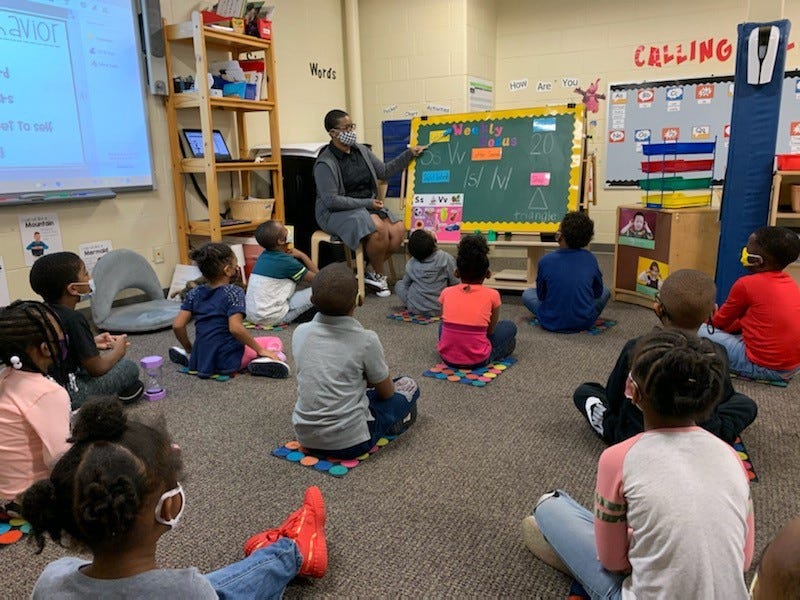
- Childcare centers have been able to stay open with limited coronavirus cases, a recent CDC report found.
- The report surveyed programs in eight states and found mask-wearing and social distancing by kids and staff helped them avoid outbreaks.
- Eliminating shared spaces and food, as well implementing screening and cleaning protocols, also helped keep the centers safe.
- Even when the centers had to close due to isolated cases, they continued to provide resources to families.
- Visit Business Insider’s homepage for more stories.
Mask-wearing, splitting kids into small groups, and close monitoring helped keep isolated cases of COVID-19 from turning into outbreaks at childcare centers across the US, according to the Centers for Disease Control and Prevention.
Previous studies have confirmed that childcare centers are not high-risk settings for infection as long as kids and staff follow safety protocols. Most notably, YMCAs served about 40,000 children of essential workers during lockdown in the spring and did not see a single coronavirus outbreak.
This may be because children are half as likely as adults to contract and transmit the coronavirus, according to a 40,000-person study as reported by National Geographic’s Lois Parshley.
The CDC review, published as a Morbidity and Mortality Weekly Report last week, showed how childcare programs in eight states receiving federal Head Start grants, serving between 500 and 2,500 low-income children each, were able to adhere to infection-preventing protocols after reopening.
In all, just nine children across three centers contracted COVID-19, and just two staff members at a fourth center.
"If you can take all these precautions that mitigate your risk, it's just so important to have kids here, because kids learn from other people." Tracey Sparrow, program director of Next Door in Milwaukee, which receives Head Start funding, told Insider. "We're serving low income kids, and if they're not in the classroom and their higher income peers are in the classroom, that gap in opportunity just widens."
Kids have to wear masks and social distance too
The CDC recommends that children aged two years and older should wear masks in public settings. In Milwaukee, where the mask mandate applies to kids aged three and up, most of the children at Next Door have gotten used to wearing masks, Sparrow said.
"Of course, there's individual children who might struggle a little bit - sort of like there's individual children who struggle to keep their shoes on during the day," she said. "But most kids don't have a problem with it."
At the YMCA of Metro Atlanta, childcare centers provide masks for kids if their parents aren't able to do so. Like many other centers across the country, they've made social distancing easier by splitting kids into cohorts, said Andrea McMichael, vice president of early learning.
Cohorts are small groups where kids can play together, while they social distance from those outside of their pods.
"We know, at this age, kids are going to want to be close to each other and interact with each other," McMichael told Insider. "So this kind of helps us track what's happening, so if we do have some sort of an outbreak, we know who was in close contact and who wasn't."
Childcare centers also closed common areas and eliminated shared snacks
Social distancing was also helped by the elimination of common areas where adults might gather, like the teacher's lounge at Next Door. Teachers and caregivers at Next Door were also assigned to classroom bubbles, Sparrow said.
While the centers were closed in the spring, they started planning logistics for a safe reopening. Next Door installed hands-free water stations, for example, and they shifted from family-style dining to doling out individual servings of food.
Across the centers studied, many reported daily screening procedures and temperature checks, intensified cleaning efforts, supervised handwashing for children, and limiting who is allowed in the building.
When the centers had to close, they continued providing resources to families
One early learning center at YMCA of Metro Atlanta had to close down for two weeks in June due to two staff cases, but the learning didn't stop during that time, McMichael said.
The center allowed parents to come pick up the meals kids would normally receive twice a week, as well as donated books and take-home activities such as seed-planting kits or instructions for making shapes out of household objects.
For kids who might not have Wi-Fi at home, those activities ensured that learning could "come alive from normal, everyday items," McMichael said.
"It's been a wonderful experience, and it's a great way for us to really think outside the box of what early learning should look like and could look like."

